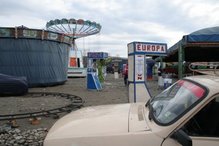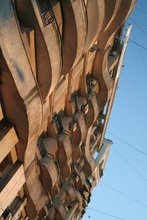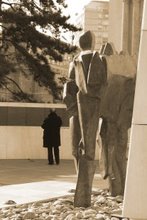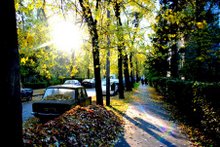
[caption on photo: Rumaenische Bauern vor ihrer Huette - postcard from the interwar period i would guess, maybe earlier]
In interviews I have recurrently encountered a certain kind of story about the ‘sat romanesc’, the Romanian village, as well as the Romanian peasant. It is a story remindful both of Christian mythology such as the Fall, where the taint of sin remains, and portrayals of the ‘noble savage’ where the subject in question oscillates back and forth between being pure, being fallen, and needing to be saved.
As in other mythical stories, this typological village is presented, despite numerous pieces of evidence to the contrary, like a unit that has existed since the beginning of time, where there have been no substantial changes since recently. Of course… Define recently. Define change. Define beginning of time.
But let us consider the grounding of the hypothesis for a moment. It is a story of innocence, corrupted, of eternity, interrupted, of paradise, lost, of angels, fallen. ‘Vesnicie s-a nascut in sat’ (eternity was born in the village). I dramatise to make the point, which is allowed. Example: ‘People have made cheese in this way for thousands of years’.
A presumed horizon of permanence is invaded with a sense of change, spiced up with loss, confusion and the shifting of boundaries and moralities. ‘Back in the days, we used to have ‘hore’, none of these discos, where no one is supervising’. ‘People have always made cheese like this and now they’re saying we’re not allowed anymore’. ‘… and now the eternity has been ended by us/them’.
One old guy tells me, well you know, this modern lifestyle isn’t very healthy, look at how many people are ill! There’s never been so many illnesses around. If this argument is made, it is often omitted that, actually, life as a peasant is pretty rough, because the state, the emperor, the landlord were never particularly forthcoming vis-à-vis this category of people. More cake for the peasants! More life span! More medication! (I just wrote a typo ‘meducation’, which screams for a post of its own… passons!)
When you look at nineteenth century sources (from Durandin 1995), despite agrarian reforms, people were not doing so well in the countryside. The rural idyll, in close-up, is lessened. Modernity plays in cities, not on the fields.
‘Les temps où l’on disait: “si vous voulez voir un type d’homme bien portant, allez dans les campagnes” sont passés. Sur toutes les physiognomies, enfants, vieillards, on ne lit que fatigue physique, langueur, chloroanémie, ils sont vieillis avant l’âge et one le moral très abattu. J’ai tâché de connaître la cause, et partout j’ai vu la misère. Tous ont tant de dettes qu’ils ne savent comment les payer’ (p.165).
A study of the ‘Economic and Social Situation of the Peasant in Romania’ (much like those published by the European Commission these days… ;-)) published in 1895 has a bit of statistics that tell ofs the physical state of the peasantry.
‘Reprenant les résultats des recencements des années 1869, 1874, et 1879, il indique qu’en 1869 un tiers des conscripts n’atteignent pas la taille de 1,57m requise pour le service; en 1879, un tiers se situent au-dessous de 1,54m. Il déplore aussi la multiplication des cas d’idiotisme [linked to lack of iodine, and thyroid dysfunction from birth] et de syphilis’ (p.165).
Agrarian revolts were never mentioned in the interviews, even though a lot of them happened in Romania in the last decades of the nineteenth century, and one particularly violent one in 1907. We are at the limits of narrative life-story methodology, because it does not go back far enough in time to appreciate, and so history books and historical sources are important supplements to go back further in time than 70 years at most. This spans, at best, a bit of time before communism was established. The horizon of reference of the interviews can be communism – post-communism. The nationalist, populist, and fascist politics of the turn of the century and anything earlier do not get an appreciation, also taking into account the way in which history education under communism had its own twist, legitimating the regime in place.
A few points emerge:
In Romania a complicated mythology exists around people’s historical origins, usually to be found in the countryside. Livelihoods: peasantry, agricultural work, commerce.
This mythology is both appropriated by the people left out by the recent changes in legislation due to European Union demands, and national policy, to affirm that the conservative, traditional elements have a value, and that they need to be protected, without, however, having much leverage power to put this into practice on their terms.
It is also appropriated not only by people representing the authorities, but also by people living in the countryside who are not peasants (who may consider themselves ‘intellectuals’ or city people who have worked in industry) that the people in question (‘peasants’) are inappropriate, that they need to modernise, to change, to adapt, in order to profit. They are considered backward, uncivilised, uneducated.
Funnily enough, the people who fall into the second category are also arguing for the salvation of the Romanian village, because it is the seat of the traditions, of popular music, poetry, architecture and dance. What exactly is there ‘to save’? So we save the traditions in a purified form and we discard the peasants? To me it sounds a bit like fission that removes the characteristics of the original substance and creates something else altogether. If, that is, substance is the right word to use here.
There is, it seems, nothing new under the sun. The French-educated historian Nicolae Iorga, who played a role in creating nationalist sentiments in pre-Balkanic-wars-Romania, directs, from 1903, the periodical ‘Samanatorul’, which promotes a socially and morally engaged national literature. In it, rural values are celebrated: the peasant is the vector of continuity, of collective memory and of respect of tradition. He is the figure of resistance against decadence, foreign pollution, and the anonymity and misery of the cities.
I am reminded of Justin Kenrick’s lectures and the idea of closure, that it had to be either idealist and pure, or materialist and wicked. I want an appreciation not centred on these opposites begetting opposites begetting opposites and not much light, though I understand that people want to make one argument, not the other. I have the anthropology illness, of not wanting to decide for one side… doesn’t make me a good interviewee as I recently found out… ;-)








No comments:
Post a Comment